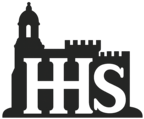 |
HOME > PROJECTS |
|---|
| PART 2 > |
RUSSELL BOWLBY (1792-1865)
THE LIFE AND TIMES OF THE MEMBER OF PARLIAMENT THAT NEVER WAS!
25 JUNE 2020
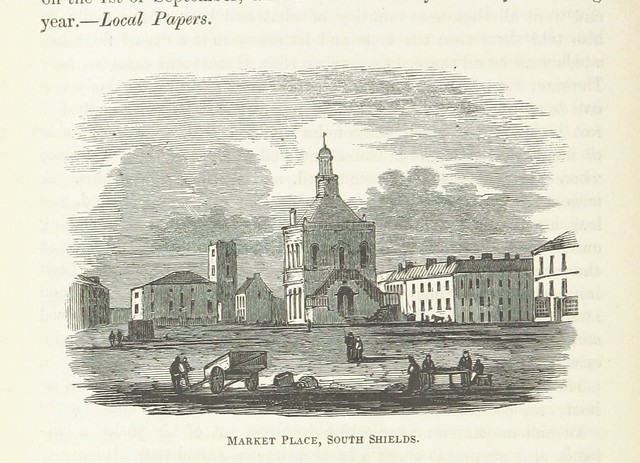
Part 1: The Build up to South Shields Parliamentary Election of 1832
Whenever I have asked anyone if they have ever heard of Russell Bowlby, one or two may imply that he was a figure of disdain because he polled only two votes in the South Shields Parliamentary election of 1832 that he fought a duel before that accounting for his disastrous result. Although both are facts, they are misconstrued and there is no correlation between them.
With two creditable means of securing nomination for the Whig Party and the Reform Party he received neither I suggest because of the untimely death of Nicholas Fairles and the unscrupulous actions and the vested interests of a few of the leading men of the joint townships of South Shields and Westoe.
'At the outset of the contest, I certainly looked forward to a very different termination, having been taught to suppose that; the ''proud situation of the first representative of our maiden borough'' was within my grasp.' (1).
He finally took a third option to be an Independent Radical candidate, perhaps to ensure that for posterity his name was on the ballot paper. He withdrew his candidature on the day of the election (Part 2).
Russell Bowlby was a proud resident of South Shields living in what is now defined as South Tyneside for almost 50 years; a man of the people committed to social justice, a reformer, a visionary who appears to have wanted to increase the significance of the town through trade and improved communications. Yet unlike his adversaries there is no street named after him nor is there an image of him in any form.
Born in Shincliffe, Durham in 1792 Russell Bowlby was Christened at St. Oswald's Church, Durham on the 9 July 1792. He was the eldest son of Sarah Elliott (1774-1855) & John Bowlby (1766-1835) who later became Registrar to the Dean and Chapter of Durham; By 1798 the family had moved to the South Bailey, Durham City. Russell was a pupil at Durham School until 1808 when he was indentured as an Articled Clerk moving to South Shields in 1813 to practice as a solicitor.
My initial knowledge of Russell Bowlby was in the writing of a dissertation 'The South Shields Mechanics Institute' in 1969. I was impressed by the fact that as a subscriber, he made his contribution in perpetuity and that it exceeded the payment made by other contributors. He was proposed by James Laing, a ship builder and owner in 1813, the year he settled in South Shields as a member, of the South Shields Exchange Subscription Room Library held in the Town Hall. It was in 2012 that I transcribed the minutes and since then I have profiled over two hundred of the members, the leading men of the day which has provided me with an insight into their connections with one another with regard to business, politics and not least of all, family marriages.
I have been unable to establish when Russell Bowlby first became politically active. There was a significant turning point in his career in 1818 when he acted for Robert Green, the leading Magistrate for South Shields and Westoe, and Nicholas Fairles, his deputy and brother in law who were affiliated to the Whigs, the Liberal Party. Prior to 1832 there was no parliamentary representation. Bowlby made an application on their behalf to the New Courts at Durham for the acquisition of land from Isaac Cookson (glass-manufacturer) of 246 yards, which was required to add to the land owned by Robert Green for the development of the Mill Dam (2).
With the death of Robert Green in 1819, Nicholas Fairles became the leading magistrate. On the 28th December 1820 he convened a meeting at the Town Hall of the Magistrates, Clergy, Gentry, Ship Owners etc., unanimously resolving that representation should be made to the King regarding the establishment of South Shields and Westoe as a parliamentary borough (3). This was followed a week later by a more substantive meeting 'for the purpose of taking into consideration the propriety adopting an address to the King. Our correspondent informs us, that the meeting was the most respectable and the most numerous he ever witnessed in that town. Many spirited and well-delivered speeches were made on both sides the question the principal speakers were Henry Heath, of Westoe; Philip W. Buckham, of Laygate; George T. Fox, of Westoe; and Russell Bowlby, of South Shields' (4). The petition submitted in 1821 did not meet with success.
At the age of only thirty, Russell Bowlby was already at the centre of political life of the two townships as a campaigner and orator; it was from this point and for the next decade that he was considered to be the potential Whig Party candidate once parliamentary representation had been granted. There are several references of Bowlby's credibility as a Whig party candidate in the newspapers during this period.
A meeting chaired by Nicholas Fairles in the Town Hall on the 31st December 1830 again considered petitioning Parliament:-
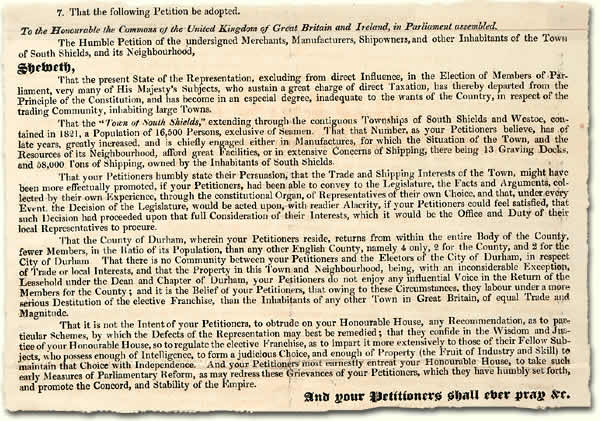
IMAGE 1: REFORM POSTER
The Humble Petition of the undersigned merchants, Manufacturers, Shipowners, and other Inhabitants of the Town of South Shields, and its Neighbourhood,' regarding 'the present State of Representation' … the ''Town of South Shields,'' extending through contiguous Townships of South Shields and Westoe, contained in 1821, a Population of 16,500 Persons, exclusive of Seamen .... that this, has 'greatly increased, chiefly engaged either in Manufactures, or in extensive Concerns of Shipping, there being 13 Graving Docks, and 58,000 Tons of Shipping, owned by the Inhabitants of South Shields.'
'That the County of Durham, ... returns fewer Members, in the Ratio of its Population, than any other English County, namely 4 only, 2 for the County, and 2 for the City of Durham.' That there is no Community 'between your Petitioners and the Electors of the City of Durham, in respect of Trade or local Interests, and that the Property in this Town and Neighbourhood, being, with an inconsiderable Exception, Leasehold under the Dean and Chapter of Durham, your Petitioners do not enjoy any influential Voice in in the Return of the Members for the County; and it is the Belief of your Petitioners, that owing to these Circumstances, they labour under a more serious Destitution of the elective Franchise, than the Inhabitants of any other Town in Great Britain, of equal Trade and Magnitude.'
'And your Petitioners most earnestly entreat your Honourable House, to take such early Measures of Parliamentary Reform, as may redress these Grievances of your Petitioners, which they have humbly set forth, and promote the Concord, and Stability of the Empire.'
And your Petitioners shall ever pray &c.
The meeting was attended by many of the significant gentlemen not only of the joint townships but also of the greater area. It was unanimously resolved to proceed to petition both the Houses requesting that the Lord Lieutenant of the County should present the Petition to the House of Lords, and the MP's for Newcastle upon Tyne, to the House of Commons (5). This was part of a massive country-wide campaign where e.g. there were 30,000 signatures from Manchester alone.
Russell Bowlby prepared to represent South Shields in the first parliamentary elections for the borough standing as a Liberal Candidate with Thomas Salmon as his Election Agent; he promoted Free Trade and campaigned for Reform of the State and Church. He perhaps embodied the political ambitions of Nicholas Fairles, and Robert Green who for twenty years prior to his death had campaigned for the townships to have independence from the Palatinate of Durham and from Newcastle to be a separate parliamentary borough. Working in South Shields between 1813 and 1828 with homes in Barrington Street and Chapter Row, he purchased one of the homes of Robert Green, Cleadon Meadows which was by 1831 his main residence.
Nicholas Fairles's aspiration that South Shields and Westoe should combine and receive royal assent to be an independent parliamentary borough was within his grasp with the passing of the Great Reform Bill on the 4th June 1832. Sadly, seven days later two men attacked him on whilst riding on horseback towards Jarrow to investigate an insurgency at the colliery. The murder of this Senior Magistrate in the fulfillment of his duties has in recent times been the subject of much debate unjustifiably demonizing him. It was Robert Ingham who was one of the two prosecuting barristers when the case went to trial at Durham on the 3rd August 1832 securing the conviction of William Jobling for the murder of Nicholas Fairles although Fairles himself, prior to his death on the 21st June identified Robert Armstrong who escaped prosecution as the perpetrator. William Jobling was found guilty of Mr Fairles's murder, hanged and gibbetted at Jarrow Slake (6).
It is perhaps churlish to consider that in securing this conviction, Robert Ingham would gain popularity. He was unscrupulous in his quest to be the first MP for South Shields. In a letter purported to be written to the Newcastle Chronicle on the 8th June to the Electors of South Shields and Westoe he declared his interest in being the parliamentary candidate:
'At the proper Season, I shall present myself my Brother Electors under a deep Sense of their past Kindness to me, and respectful Hope of their Favour. In the meanwhile, it shall my Study, it has hitherto been, to profit by every Opportunity of learning the Wishes and Interests of the town, and of explaining my Opinions the Electors'
The other correspondence in the newspaper was written within days of publication on the 30th August whilst that of Robert Ingham's seems to be out of cinque. My suggestion is that this letter was written after the attack on Nicholas Fairles and that it was withheld from publication awaiting the inevitable death of Nicholas Fairles and Ingham's attempt to endear himself to the electorate. (7)
ROBERT INGHAM
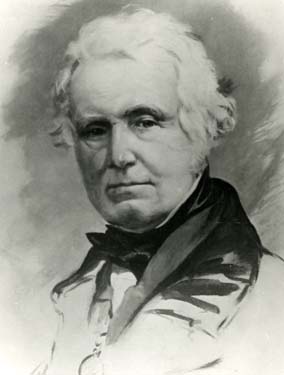
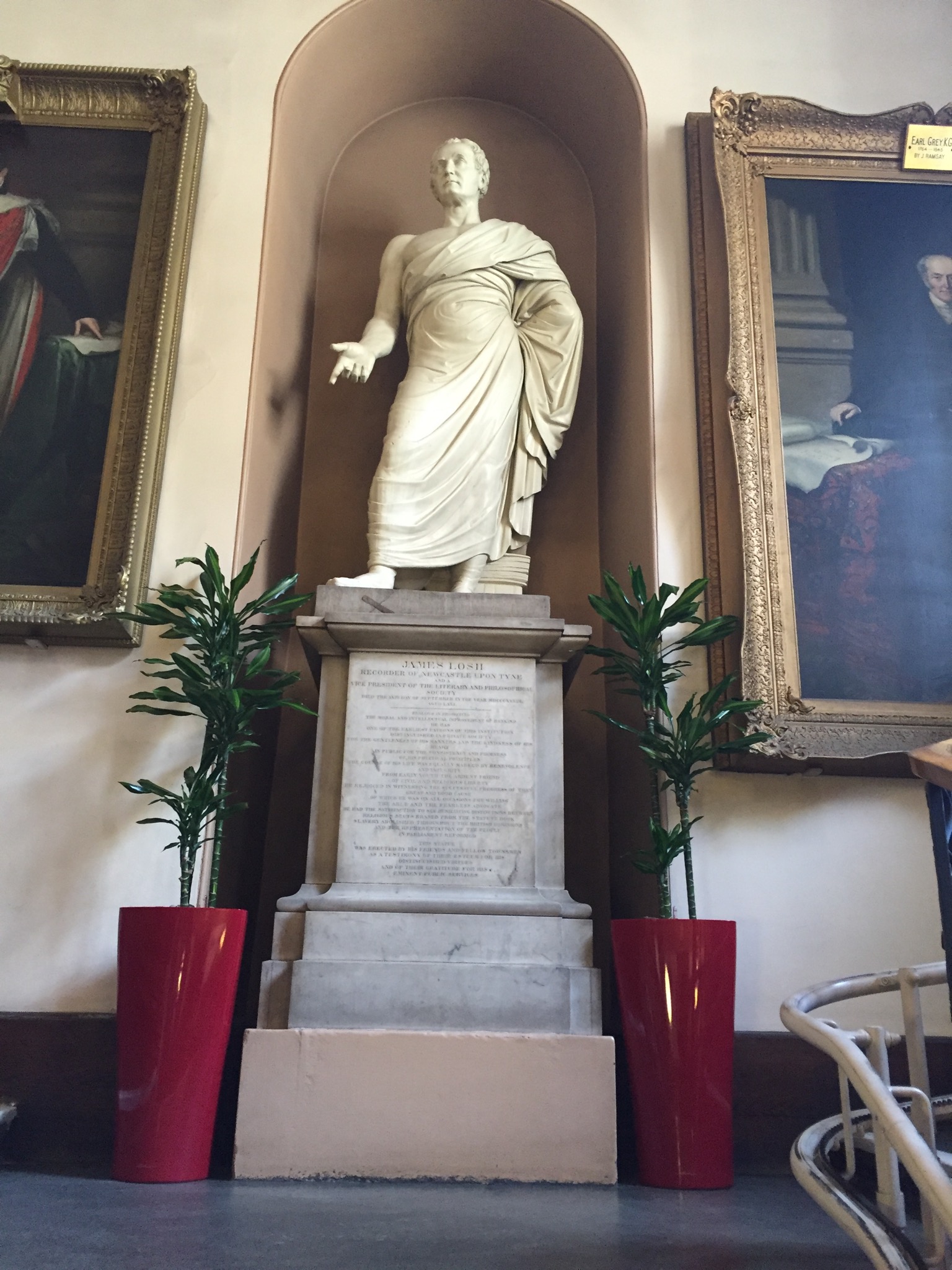
IMAGE 3
JAMES LOSH
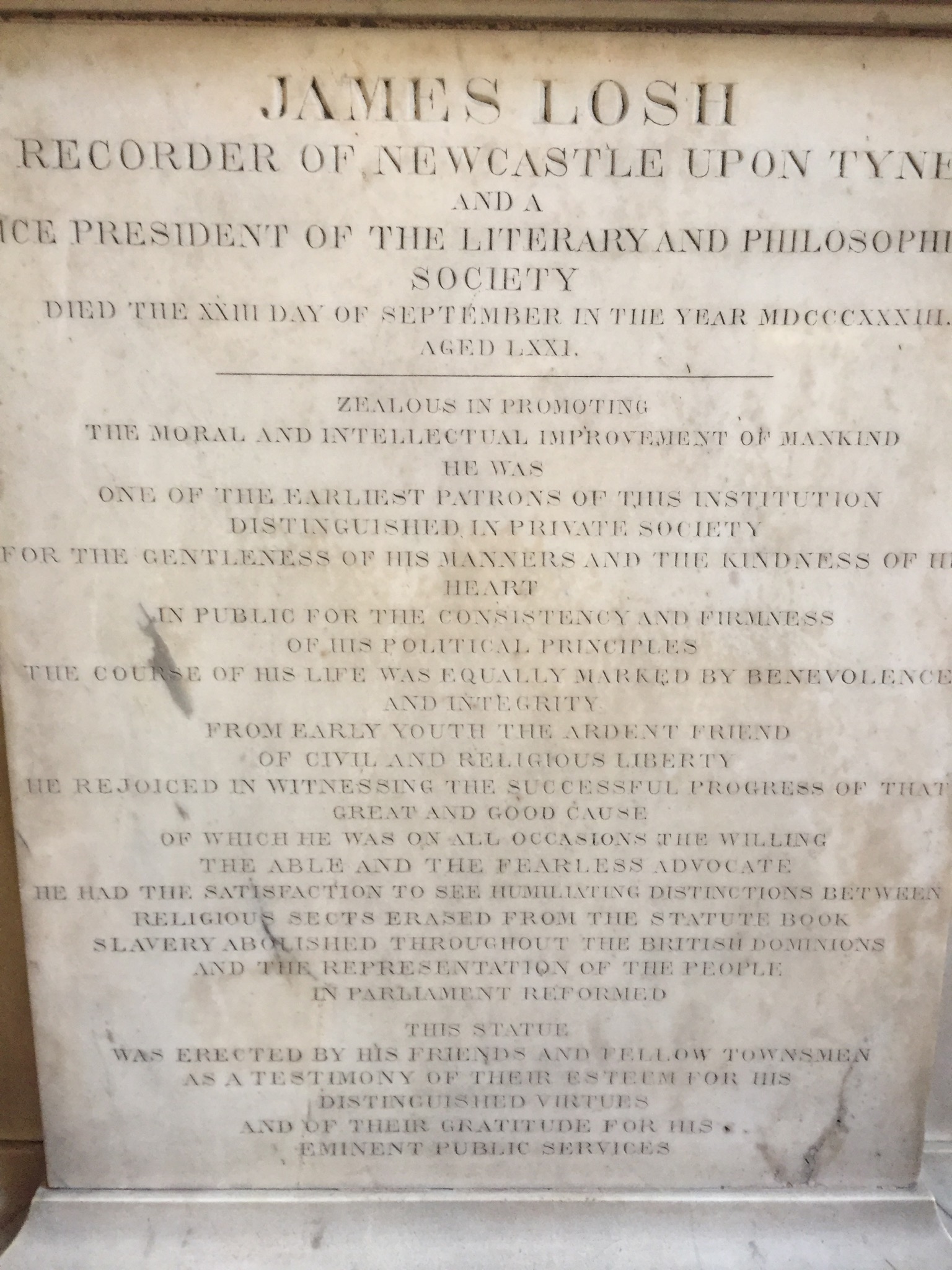
IMAGE 4
JAMES LOSH PLAQUE
RECORDER OF NEWCASTLE UPON TYNE AND A VICE PRESIDENT OF THE LITERARY AND PHILOSOPHICAL SOCIETY DIED THE XX111 DAY OF SEPTEMBER IN THE YEAR MDCCCXXX111. AGED LXX1. …FROM EARLY YOUTH THE ARDENT FRIEND OF CIVIL AND RELIGIOUS LIBERTY: HE REJOICED IN WITNESSING THE SUCCESSFUL PROGRESS OF THAT GREAT AND GOOOD CAUSE OF WHICH HE WAS ON ALL OCCASIONS THE WIILING THE ABLE AND FEARLESS ADVOCATE: HE HAD THE SATISFACTION TO SEE HUMILIATING DISTINCTIONS BETWEEN RELIGIOUS SECTS ERASED FROM THE STATUTE BOOK: SLAVERY ABOLISHED THROUGHOUT THE BRITISH DOMINIONS AND THE REPRESENTATION OF THE PEOPLE IN PARLIAMENT REFORMED ….
Prior to 1830, Robert Ingham had little involvement in the life of either township. It was not until Wednesday, 29th June 1831 that he was proposed by Dr M Winterbottom (by which time Russell Bowlby had been a member for 28 years) to join the Exchange News Room; he was accepted but only attended this meeting whilst Dr Winterbottom attended sixty-nine.
As to Bowlby, he appears to have maintained his aspiration to be the Whig candidate and there are references to his attendance at political events and his association with confirmed Whig candidates for neighbouring constituencies. It was in late July that in the Morning Post the following comment was written relating to South Shields -
Russell Bowlby 'ventures upon very unsafe ground in this borough' (8).
The de-selection of Russell Bowlby as the Liberal Candidate and the adoption of Robert Ingham, an occasional resident of Westoe as his replacement appears to happened with undue haste following the death of Nicholas Fairles. This may well be attributable to the ascendancy of James Kirkley assuming the position of Senior Magistrate. Although he was no stranger to Russell Bowlby, having attended several committee meetings at the Subscription News Room with him he soon showed his allegiance to Robert Ingham. He chaired several meetings in promotion of him; the most significant of which was a dinner for 100 held in Mr. Oyston's assembly room with tables 'tastefully ornamented with evergreens, flowers, etc.' (9). Thomas Salmon was subsequently appointed his agent.
I can't find any evidence of James Kirkley's political affiliation, which is not surprising as it is only to be found in his obituary:-
'on the 18th inst. after a few hours' illness, James Kirkley, , of Dene Villa, near South Shields ..who had recently taken an energetic part on the liberal side of public questions, and had thereby secured the gratitude of many … died under an attack of cholera' (10).
Supporting Russell Bowlby in his campaign to be the Whig candidate was Hedworth Lambton, himself a candidate for the North Division of Durham and he visited South Shields' Town Hall on the 7th September 1832 (11) the day before the endorsement of Robert Ingham. Perhaps a last-ditch attempt to secure Bowlby's candidature. Lambton's rival representing the Conservatives was Edward Richmund Stanley Bagot Gale Braddyll aged only 25 years at the time sponsored by the Marquis of Londonderry. There was animosity between the landed gentry representing the main two political parties in County Durham especially between Lambton and Londonderry who was opposed to the Great Reform Bill and therefore the status of South Shields as a parliamentary borough.
Bowlby said of Bradyll:-
''as a chicken newly hatched, which the pious clucking hen, Mother Church, was invited to shelter under her dingy wings.''
Bowlby spoke on impulse, driven by his dislike of the establishment and the support of the Conservatives by the Church of England in the county. Bradyll made derogatory remarks about the Liberal party. Hostile correspondence between Bowlby and Bradyll pursued as a result of this political slander (12) and Bradyll challenged Russell Bowlby to a pistol duel. This took place twenty days later on the 27th September at Offerton Lane, Herrington. Captain Peter Bowlby of the 4th Regiment of Royal Artillery, a cousin of Russell Bowlby attended him. After he fired a shot, Braddyll discharged his gun in the air. Russell Bowlby declared his regret for his utterances & Bradyll apologised for his adverse comments.
Later that day, at 12.30pm, Braddyll was involved in another dual at the Hare and Hounds on the Sedgefield Road with Sir Hedworth Williamson, 7th Baronet of Whitburn Hall who had said that Bradyll was “a nominee of the Marquis of Londonderry†whilst in the ensuing correspondence Braddyll charged Sir Hedworth with “wilful misrepresentationâ€. After they each fired two shots, the confrontation ended. Subsequently Sir Hedworth sent a written apology to Bradyll (13).
Comments
The incident at the Town Hall on the 7th September leading to the duel with Bradyll was not the cause of Russell Bowlby's demise and it is disingenuous to suggest otherwise. Sir Hedworth Williamson already an MP in 1831 was elected as MP for North Durham in 1832, the subsequent duel with Bradyll having no impact on his political career. The grand banquet on the 8th September to endorse Robert Ingham as the Whig candidate, would have been weeks in the planning and may have been a source of information for the Morning Post on the 31st July suggesting that there were machinations a foot to destabalise Bowlby's candidature. Some of the protagonists especially in later years, made important contributions to the development of the borough.
References
- A Decennial Supplement to South Shields, Its Past Present and Future by Thomas Salmon P5-8
- Durham County Advertiser, 6th June 1818 p. 1 (British Newspaper Archive)
- Durham County Advertiser - Saturday 06 January 1821 p.2 (British Newspaper Archive)
- Durham County Advertiser - Saturday 06 January 1821 p.3 (British Newspaper Archive)
- Newcastle Chronicle, 8th January 1831 p. 2 (British Newspaper Archive)
- Newcastle Journal - Saturday 04 August 1832- p. 1-2 (British Newspaper Archive)
- Newcastle Chronicle , Saturday 30 June 1832, p.3 (British Newspaper Archive)
- Morning Post - Tuesday 31 July 1832 (British Newspaper Archive)
- Newcastle Chronicle - Saturday 08 September 1832 (British Newspaper Archive)
- Newcastle Chronicle - Saturday 22 September 1832 (British Newspaper Archive)
- Herald of Peace, Vol. 8, p.521
- Herald of Peace, Vol. 8, p.521
- Historical Register of Remarkable Historical Events, John Sykes, p. 397-398
Images
- A reform poster from South Shields in County Durham, 31 August 1830 (Catalogue ref: HO 44/24)
- Robert Ingham by William Downey
- James Losh - photograph taken at the Literary and Philosophical Society, Newcastle-8th June 2016
- James Losh Plaque - photograph taken at the Literary and Philosophical Society, Newcastle-8th June 2016